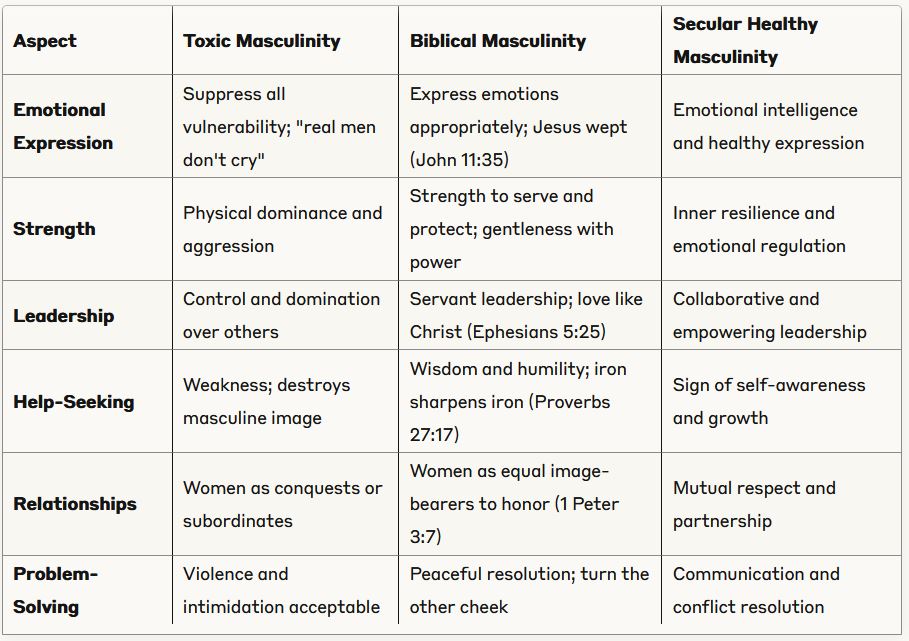The Hidden Crisis
Men are dying in silence. Despite making up nearly 80% of suicide deaths, men are half as likely to seek mental health support compared to women. Behind this devastating statistic lies a cultural collision between what society tells us makes a “real man” and what actually makes us whole human beings.
The Battle Within: Understanding Toxic vs. Biblical Masculinity
The term “toxic masculinity” gets thrown around a lot these days, but what does it actually mean? And more importantly, how does it differ from the biblical vision of manhood that has guided men for centuries?
Research Reveals the Problem
A comprehensive study from the University of South Carolina examining college-aged men found that those who scored higher on toxic masculinity measures reported significantly more self-stigma and negative attitudes toward seeking help. The research used validated psychological scales to measure traits like emotional suppression, dominance over women, and violent problem-solving.
Meanwhile, a systematic review published in Clinical Psychology Review analyzing 37 studies revealed that men’s conformity to traditional masculine norms creates a threefold barrier: it affects how they express symptoms, their willingness to seek help, and how they manage mental health challenges.
But here’s where it gets interesting. Research by Nancy Pearcey provides compelling evidence that authentically committed Christian men actually outperform their secular counterparts as spouses, showing higher levels of compassion, marital satisfaction, and emotional intelligence.
The Tale of Two Masculinities

The Real Enemy
The problem isn’t masculinity itself—it’s the counterfeit version that’s been poisoning our culture. As one biblical masculinity expert notes, “The real problem is not an inherent flaw in masculinity itself. It’s that American society has become secularist and has lost the biblical vision of manhood.”
Toxic masculinity teaches men that seeking help equals weakness. Biblical masculinity teaches that wisdom comes from seeking counsel (Proverbs 19:20) and that bearing one another’s burdens fulfills the law of Christ (Galatians 6:2).
Breaking Down the Barriers
The Science of Male Isolation
Research published in Frontiers in Psychiatry identified specific barriers men face:
- Fear of judgment for violating masculine norms
- Concerns about confidentiality and word getting out
- Poor mental health literacy—simply not knowing the signs
- Preference for self-reliance over professional help
But here’s the encouraging news: the same study found that men who did seek help experienced significant positive transformation in their attitudes toward both mental health and traditional masculine norms.
The Path Forward
Biblical masculinity offers a different framework. Instead of emotional suppression, it calls for appropriate emotional expression. Instead of avoiding help, it encourages seeking wisdom. Rather than domination, it promotes servant leadership.
As one study participant reflected after receiving help: “This kind of thing, of ‘I cannot show weakness, I cannot be sick’ should be avoided.”
Take Action: Your Battle Plan
1. Redefine Strength
Today’s challenge: Write down three men you admire most. Next to each name, list their strongest qualities. Notice how many involve emotional intelligence, wisdom, or the courage to be vulnerable when needed.
2. Build Your Council
Biblical masculinity emphasizes community. Proverbs 27:17 says “iron sharpens iron.” Start building a small group of trusted men who can speak truth into your life.
- Identify 2-3 men whose character you respect
- Schedule monthly coffee or brief check-ins
- Practice sharing one real struggle, not just surface-level updates
3. Learn the Signs
Mental health literacy saves lives. Familiarize yourself with signs of depression and anxiety:
- Persistent sadness or emptiness
- Loss of interest in activities you used to enjoy
- Changes in sleep or appetite
- Difficulty concentrating
- Thoughts of self-harm
4. Normalize Help-Seeking
Change the narrative in your circles. When someone mentions therapy or counseling, respond positively: “That takes courage” or “Good for you for taking care of yourself.”
5. Emergency Preparedness
Just like you’d prepare for other emergencies, have mental health resources ready:
- National Suicide Prevention Lifeline: 988
- Crisis Text Line: Text HOME to 741741
- Local counseling services contact information
Try This Today
The 5-Minute Check-In: Before bed tonight, ask yourself these three questions:
- What’s one emotion I felt today that I didn’t acknowledge?
- Who in my life could I reach out to if I was struggling?
- What’s one small step I could take toward better mental health?
Write down your answers. This simple practice begins rewiring your brain to recognize emotions and identify support systems.
The Bottom Line
True strength isn’t about never needing help—it’s about having the courage to seek it when you do. Whether you find your foundation in biblical principles or secular wisdom, the goal remains the same: becoming the healthiest, most complete version of yourself.
Tomorrow, we’ll explore how to build morning routines that actually stick and set you up for daily success.
🤝 You’re not alone in this journey
Resources
- University of South Carolina Study on Toxic Masculinity and Help-Seeking
- Systematic Review: The Role of Masculinity in Men’s Help-seeking for Depression
- Young Men, Help-Seeking, and Mental Health Services Study
- Biblical Masculinity Research by Nancy Pearcey
- Frontiers in Psychiatry: Masculinity and Help-Seeking Among Men With Depression
- Toxic Masculinity vs Biblical Masculinity – Proclaim & Defend
- National Suicide Prevention Lifeline
Leave a Reply